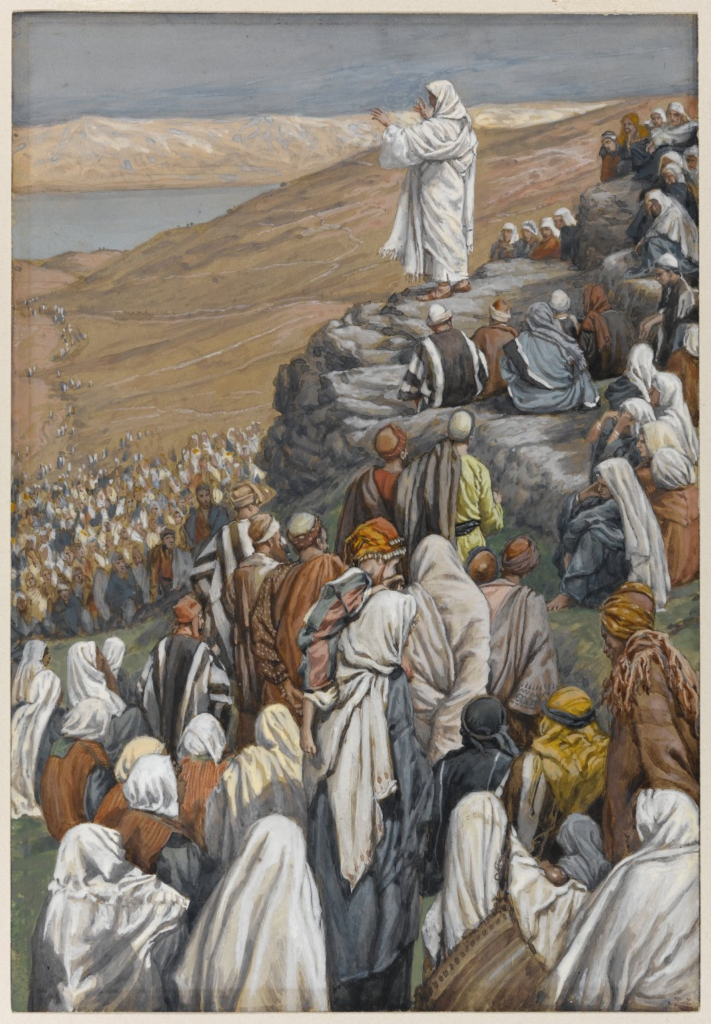Matthew 5:1-12a
When Jesus saw the crowds, he went up the mountain,
and after he had sat down, his disciples came to him.
He began to teach them, saying:
“Blessed are the poor in spirit,
for theirs is the kingdom of heaven.
Blessed are they who mourn,
for they will be comforted.
Blessed are the meek,
for they will inherit the land.
Blessed are they who hunger and thirst for righteousness,
for they will be satisfied.
Blessed are the merciful,
for they will be shown mercy.
Blessed are the clean of heart,
for they will see God.
Blessed are the peacemakers,
for they will be called children of God.
Blessed are they who are persecuted for the sake of righteousness,
for theirs is the kingdom of heaven.
Blessed are you when they insult you and persecute you
and utter every kind of evil against you falsely because of me.
Rejoice and be glad,
for your reward will be great in heaven.”
BACKGROUNDER
This week the Church begins to read through the most famous speech ever given, Jesus’s Sermon on the Mount, which covers Matthew 5-7. And we begin on a mountain. Why does Jesus go up a mountain?
Mountains are all through the Bible. And whenever the Bible tells us about a mountain, we are with someone who is close to God. The most famous mountain in the Old Testament is Mt. Sinai, where Moses leads the chosen people. There the form a covenant with God, and receive the Ten Commandments.
Jesus is God in person, and he shows his closeness to God by going up a mountain. But, instead of receiving Commandments from God, Jesus speaks on his own authority. In fact, He speaks with the authority of God, because that’s who he is.
Actually, Jesus is closer to the Father than anyone of us, even Moses, could ever be. God had promised Moses, that He would, “raise up for them a prophet like you from among their own people” (Deuteronomy 18), but the same book concludes with the mysterious statement, “Never since has there arisen a prophet in Israel like Moses, whom the Lord knew face to face.” (Deuteronomy 34) Only Jesus could surpass Moses, because Jesus is the Lord.
And so, Jesus gives us a new law, and something more than a law. The Ten Commandments are mostly negative, telling us what we shouldn’t do. They are divine warnings, marking out a path that keeps us close to God, in a covenant with him. But the whole Old Testament shows us that even God’s chosen people, Israel, could not keep the law. In the New Testament, Paul writes to the Galatians, “no one is reckoned as righteous before God by the law, for the one who is righteous will live by faith.” (Galatians 3)
Faith means trusting in Jesus, and in his mercy. We all fall short. But, as we read this week, we are all called to more. The beginning of the Sermon on the Mount, known as The Beatitudes (The Blessings), ask us to embark a journey of becoming more and more like Jesus himself, humble, meek, seeking justice, peacemakers …
The only way that we can do this – make Jesus our standard – is by giving him our lives. Only then can we, as individuals and as a community, show the world what the world needs to see: the Father.

